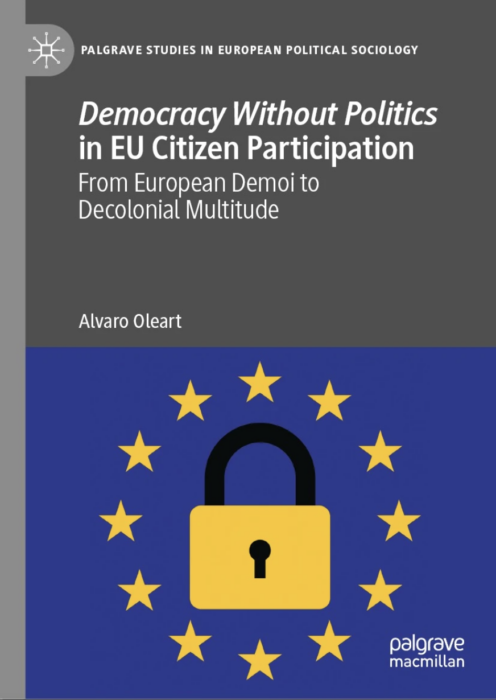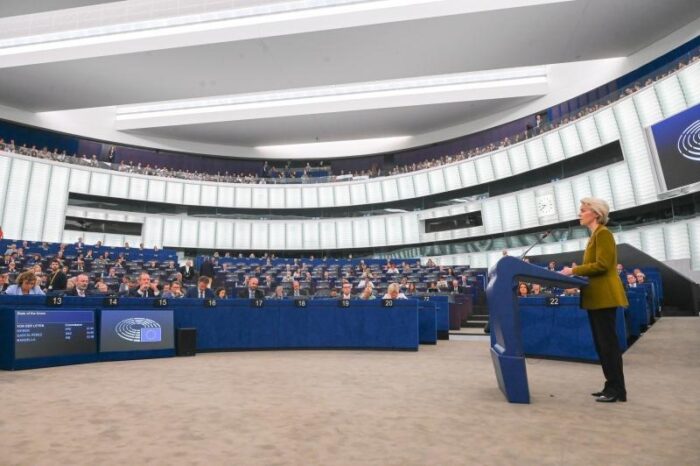Democracy without Politics in EU Citizen Participation

Can citizen panels save Europe?
Reflections on the Conference on the Future of Europe
Democracy without Politics in EU Citizen Participation
From European Demoi to Decolonial Multitude
by Alvaro Oleart
London, 2023
Rome wasn’t built in a day, but Italy was created with a handshake.
When Giuseppe Garibaldi met King Vittorio Emmanuele II in Teano back in 1860, modern Italy was born. Fast-forward 160 years, and a random European citizen in Campania, Italy, answers the phone to a surprise call from Brussels: “Can you take part in the Conference on the Future of Europe?”
What does one thing have to do with the other?
Everything, according to Alvaro Oleart’s Democracy without Politics in EU Citizen Participation, which uses Antonio Gramsci’s idea of a ‘passive revolution’ to understand the Conference on the Future of Europe (CoFoE). Gramsci looked across at the French Revolution, which seemed much more active than the Italian version and made significantly more changes to who held the ruling power. By contrast, the Risorgimento changed little materially and kept the same Italian aristocrats in power. Oleart implies that the elites of the European institutions recently attempted a similar passive revolution with the CoFoE. Public institutions lacking democratic legitimacy are increasingly attempting to cover it up with citizen panels, according to Oleart, who calls this the “citizen turn”.
Democracy without Politics starts with Oleart’s research into the CoFoE but launches into much broader questions. Is there a European people? Why stop at Europe? Is there a better way of building a more democratic world? In around 250 pages, Oleart takes us through a re-imagining of European studies as we know it, critiquing the Eurocentric way in which academia conceives of the EU.
Thinking of a European people is extremely passé, it turns out. The European demos does not exist in any meaningful way, and while due attention is given to the popular European studies idea of ‘demoicracy’, a polity of multiple distinct peoples (at least 27 different ones in the case of the EU), this is not the solution either. Oleart considers ‘sovereignty’ and ‘the people’ to be conservative ideas that legitimise existing political structures and protect the position of certain groups over others. The major theoretical contribution of this book is the ‘decolonial multitude’, a new activist way of conceiving of the demos. ‘Decolonial’ because of an awareness of how the European continent became rich and of the power relations that still exist now, as shown by migration policies and trade flows. ‘Multitude’ because of the interlinked world, where corporations operate globally but social movements like Black Lives Matter and #MeToo also function across borders.
Back to the Conference itself.
Why did the EU organise the CoFoE in the first place? Well, the Commission and Council appear to be conscious of the lack of public involvement in their work. Brexit helped the European institutions learn that there is a perceived lack of democratic legitimacy. Previously, Brussels had experienced a ‘participatory turn’, where civil society actors helped bridge the gap between the elusive European citizen and the institutions. This is not without its problems. The highly politicised policy specialists who work in the ‘Brussels bubble’ today are mostly business actors who are united by a neoliberal perspective. This failure to establish a real conduit between the EU citizens and institutions has led to a need for a more ‘direct’ democracy: the ‘citizen turn’. Oleart sees this as a sanitised and institutionalised version of grassroots political movements like the Indignados. The idea that democracy does not need politics, just citizen panels, is totally wrong for Oleart.
Political parties, NGOs and trade unions were excluded from the CoFoE, as the Common Secretariat sought to create a ‘politically neutral’ space. The CoFoE attempted to avoid ‘partisan dynamics’. Through examples and theory, Oleart criticises this very notion, pointing out that ‘neutral’ means the status quo. Individualising participation is problematic, and organisations like unions and political parties are legitimate actors for political change. For Oleart, democracy without politics is inherently related to a rose-tinted nostalgia for the myth that democracy was born in Europe, in ancient Athens.
Kafkaesque anecdotes abound. A theatre crew, in a post-CoFoE panel organised by the Commission, provides direct responses to citizens’ points in the form of improvisation, but only in French and with delayed interpretation (the interpreters also acted). The first few sessions included deliberations based on completely incorrect facts about the EU, like discussions about activities that the EU should do, which it was already doing. The organisers introduced fact-checkers, but there were huge delays in the fact-checking process, and when citizens asked the present observers to verify certain points, organisers forbade them from replying.
Oleart makes severe criticisms of the way the CoFoE was operated. He observes that the seminars focused on such vague topics that it was nearly impossible for people to engage with them. He questions the selection of experts. At the same time, he acknowledges the enormity of the challenges of organising the CoFoE with citizens from across the EU, in a multilingual context, with no precedents to build upon.
Ultimately, the CoFoE concluded that citizens mostly want what the EU is already doing. The Commission proudly noted that the recommendations covered about 80 per cent of its work programme. How convenient, notes Oleart, who argues that the methodology was always going to lead us here. For the Commission, the main result of the CoFoE is its adoption of post-CoFoE citizen panels, its new way of ‘consulting’ people. Thinking of democracy in an EU context requires some reflection on the broader material structures that underline it, Oleart argues. The CoFoE – either accidentally or deliberately – sidelined political actors who sought to significantly change the system. And the CoFoE was engineered in a way that ensured that it could not change much.
Oleart’s blistering critique of the CoFoE is engaging, enjoyable and sometimes constructive. He dedicates significant space to the CoFoE’s operational problems, and does not seem to think they are salvageable. It feels as if he is torn: should the CoFoE be engaged with or should it be discarded entirely?
What does Oleart propose? His thought-provoking commentary on the CoFoE is a fun read, but what would he do instead? Some alternative grassroots movements are mentioned, like Palestine encampments at universities, but it is unclear how progressive actors can engage with existing institutional initiatives like the CoFoE. Yet that is his point. Perhaps everyone should just start again.
And surely the EU’s most glaring democratic deficit is the European Parliament’s lack of right of initiative. Giving the Parliament more power is not a panacea, but it could be a step towards improving democracy in the EU, and the question is hardly addressed. There again, this is not Oleart’s main concern. He seeks a truly international and decolonial movement towards material change that puts ‘the people’ – however that notion is understood – in the driving seat. He wants a decolonial multitude straining and organising towards a better world for everyone.
This piece represents the author’s personal views and not the views of the S&D Group.





